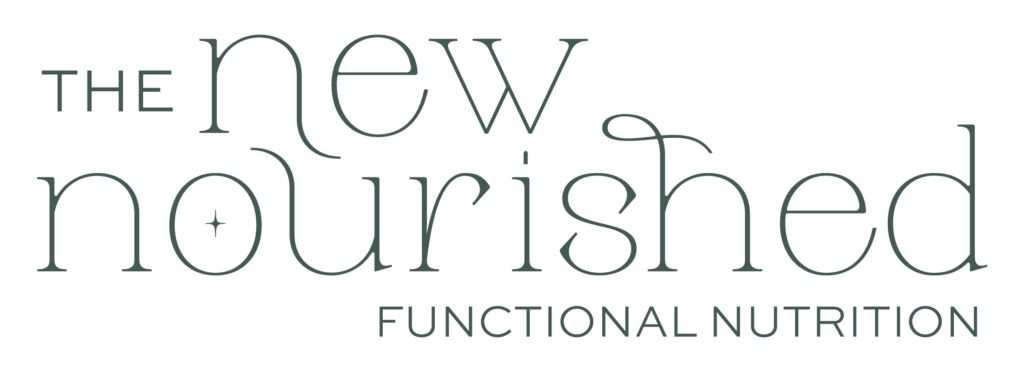Let’s talk about the oral microbiome. I bet you didn’t think that your mouth had anything to do with your hormonal health did you? Don’t worry, before becoming a functional dietitian I wouldn’t have thought to make that connection either. In functional nutrition, we are often connecting seemingly separate parts of the body which is ultimately how this approach allows for true healing and transformation.
Understanding The Oral Microbiome
What is the oral microbiome?
Similar to the gut microbiome (which you may have heard of), the oral microbiome is a community of bacteria, fungi, viruses, and other microorganisms that live in our mouths. These tiny residents are essential for keeping our oral environment balanced and healthy. They help with everything from breaking down food to defending against harmful pathogens. A healthy oral microbiome has a good mix of “friendly” bacteria that keep the more harmful bacteria in check, supporting gum health, fresh breath, and even dental structure. However, when this balance is disrupted—often due to factors like diet, stress, or poor oral hygiene—it can lead to inflammation, cavities, and eventually impacts the rest of the body, too.
How it connects to the rest of the body
When the balance of bacteria in the mouth is off, harmful bacteria can make their way into the bloodstream, triggering inflammation and eventually affecting organs far beyond the oral cavity. This is why oral health has been linked to conditions like heart disease, diabetes, and even hormone imbalances. The bacteria and byproducts from an unhealthy mouth can disrupt the immune system and cause inflammation, which in turn can interfere with hormone production and regulation. Essentially, a healthy mouth supports a healthy body, with the oral microbiome playing a key role in overall wellness.

The Hormone Connection: How the Oral Microbiome Influences Hormonal Health
The Oral Microbiome & Inflammation
Any type of inflammation is going to impact hormone health. Chronic inflammation can disrupt hormone regulation and signaling, particularly stress hormones like cortisol, as well as estrogen and progesterone.
Imbalances in the oral microbiome could be a hidden cause of inflammation due to problematic bacteria making its way into the bloodstream. Underlying inflammation is key feature of many hormonal health issues including PCOS, Hashimoto’s and infertility.
Estrogen, Progesterone & Oral Health
The connection between oral health and hormones isn’t just a one way street. Hormone fluctuations can impact oral health, too. Changes to estrogen and progesterone, like those seen during menstruation, pregnancy, and menopause, can affect the gums and oral tissues, often leading to inflammation, tenderness, and even an increased risk of gum disease. Higher estrogen levels, for instance, can increase blood flow to the gums, making them more sensitive and prone to bleeding. Meanwhile, progesterone can heighten the body’s inflammatory response, making gums swell or become more irritated.
This highlights how poor oral health and hormone imbalance might play off each other and could create a cycle of inflammation if not addressed.
Stress, Cortisol & Oral Microbiome
Stress and our main stress hormone cortisol have a significant impact on both the oral microbiome and overall hormone health. When we’re stressed, cortisol levels rise, and this can disrupt the balance of bacteria in both the mouth and gut, often favoring the growth of harmful bacteria. Elevated cortisol also weakens the immune system, making it harder for the body to fend off infections like gum disease. This combination can lead to inflammation and an overgrowth of pathogens in the oral cavity, which can, in turn, further strain the body’s stress response. Over time, this cycle can impact not only oral health but also broader hormonal balance, as chronic stress not only contributes to overall inflammation but will also disrupt the balance of cortisol levels and other hormones.
Signs of Oral Microbiome Imbalance That Could Be Impacting Hormones
Signs of an imbalanced oral microbiome can range from subtle to noticeable and include things like chronic bad breath, frequent gum inflammation or bleeding, and increased tooth sensitivity. Of course, if you’re always getting cavities filled at the dentist or other dental issues those are important signs, too!
Persistent digestive issues can be another signal that your oral health needs some TLC. Your oral microbiome directly impacts your gut microbiome (every time you swallow some of that oral bacteria is traveling down to your gut) and a healthy gut is essential for hormone balance. Your gut plays an important role in managing inflammation, is the site where thyroid hormone gets converted into its active form and is responsible for facilitating the breakdown of hormones like estrogen.
Managing inflammation and optimizing gut health are essential for treating many hormonal conditions including PCOS, hypothyroidism and infertility. Inflammation from oral health issues has even been linked to longer times to conceive and a higher risk of pregnancy complications. For this reason, paying attention to oral symptoms and incorporating habits that promote a healthy oral microbiome should be a regular part of any plan to support hormone balance.
Ways to Support a Healthy Oral Microbiome + Hormonal Balance
So now for the important part – what habits support a healthy mouth?
The oral microbiome is very similar to the gut microbiome – we want to minimize bad bacteria while preserving beneficial bacteria to keep things in balance. Having zero bacteria in our gut would lead to lots of health problems and the same goes for your mouth. Unfortunately, traditional dental care doesn’t usually take this into account. For example, traditional toothpastes and mouthwashes are designed to “kill 99.9% of bacteria,” as their packages often boast, which includes the good bacteria! Thankfully there are now toothpaste options that are more microbiome friendly (see examples below.)
Ultimately, the goal is to keep harmful bacteria in check while also allowing enough of the protective bacteria to thrive. This starts with regular brushing and flossing, but there are a few other habits you can incorporate to really optimize your oral microbiome and hormonal health.
Habits for Healthy Oral Microbiome
These are the essential habits that help maintain a balanced, bacteria-friendly environment in the mouth.
- Regular Brushing and Flossing – Brush twice a day and floss daily to remove food particles and plaque that can lead to bacterial overgrowth.
- Tongue Scraping – Gently scraping the tongue in the morning can help remove excess bacteria and prevent bad breath.
- Choosing the Right Toothpaste – Opt for a toothpaste that doesn’t contain harsh chemicals, like triclosan or sodium lauryl sulfate, which can disrupt the oral microbiome. Some of my favorites are Risewell or Fygg.
- Oil Pulling – Swishing coconut or sesame oil in the mouth for about 10-20 minutes can help reduce harmful bacteria and support a balanced oral microbiome.
- Mouth Taping at Night – Taping the mouth while sleeping encourages nasal breathing, which helps prevent dry mouth and promotes an environment where beneficial bacteria can thrive.
- Limiting Excess Sugar and Processed Foods – High-sugar foods feed harmful bacteria, increasing the risk of cavities and inflammation. Sticking to a balanced, whole-food diet supports beneficial bacteria.
- Staying Hydrated – Drinking plenty of water helps flush away food particles and bacteria, and it also supports saliva production, which is essential for a balanced oral microbiome.
- Eating Fiber-Rich and Probiotic Foods – Crunchy fruits and vegetables, as well as fermented foods like yogurt and kefir, promote a healthy bacterial environment.
- Regular Dental Check-Ups – Routine cleanings and check-ups can catch any issues early on, preventing imbalances in the oral microbiome.
These daily habits support a balanced, resilient oral microbiome that not only protects your teeth and gums but will help to optimize your hormonal health, too.
The Takeaway
If you are dealing with hormone related issues, whether you have a diagnosis like PCOS, are struggling with fertility or are simply trying to take control of your monthly PMS symptoms, taking care of your oral health should be included in your plan.
You may not be ready to incorporate all of the above habits right away (and that’s okay!) Start with flossing daily (if you aren’t already) and swapping out your toothpaste. If you’ve already got that down, experiment with tongue scraping or oil pulling. And of course, a balanced diet focused on whole foods is important not just for oral health but for supporting hormone health in many ways.
If you’re looking for more support in healing your hormones and figuring out what is going to work best for YOU, you can learn more about working 1:1 with me here. I’d love to help you learn how to optimize your health and nourish your body for lasting wellness.
This blog is for informational purposes only and is not intended to provide medical advice, diagnosis, or treatment. Always consult a qualified healthcare professional before making any changes to your diet, lifestyle, or healthcare routine, especially if you have specific health concerns or conditions. The information provided here is based on general research and is not a substitute for personalized medical advice.


